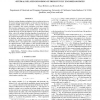Free Online Productivity Tools
i2Speak
i2Symbol
i2OCR
iTex2Img
iWeb2Print
iWeb2Shot
i2Type
iPdf2Split
iPdf2Merge
i2Bopomofo
i2Arabic
i2Style
i2Image
i2PDF
iLatex2Rtf
Sci2ools
ICASSP
2010
IEEE
2010
IEEE
Optimal delayed decoding of predictively encoded sources
Predictive coding eliminates redundancy due to correlations between the current and past signal samples, so that only the innovation, or prediction residual, needs to be encoded. However, the decoder may, in principle, also exploit correlations with future samples. Prior decoder enhancement work mainly applied a non-causal filter to smooth the regular decoder reconstruction. In this work we broaden the scope to pose the problem: Given an allowed decoding delay, what is the optimal decoding algorithm for predictively encoded sources? To exploit all information available to the decoder, the proposed algorithm recursively estimates conditional probability densities, given both past and available future information, and computes the optimal reconstruction via conditional expectation. We further derive a near-optimal low complexity approximation to the optimal decoder, which employs a time-invariant lookup table or codebook approach. Simulations indicate that the latter method closely app...
Decoder | ICASSP 2010 | Optimal Decoding Algorithm | Regular Decoder Reconstruction | Signal Processing |
Related Content
| Added | 06 Dec 2010 |
| Updated | 06 Dec 2010 |
| Type | Conference |
| Year | 2010 |
| Where | ICASSP |
| Authors | Vinay Melkote, Kenneth Rose |
Comments (0)

